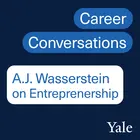
‘Career Conversations’ Podcast: A.J. Wasserstein with Max Dworin ’20
Season 2, Episode 2: A.J. Wasserstein, Entrepreneur & Yale SOM Lecturer with Max Dworin ’20
Subscribe
Subscribe to Career Conversations on Apple Podcasts, Google Play, SoundCloud,Spotify, or your favorite podcast platform.
A. J. Wasserstein is the Eugene F. Williams, Jr. Lecturer in the Practice of Management at Yale SOM. He teaches Entrepreneurship through Acquisition, the popular SOM elective course on search funds; as well as Leading Small and Medium Enterprises; and Rollups, Consolidations and Serial Acquisitions. He is interviewed by Max Dworin ’20, a second-year MBA student and former U.S. Senate staffer transitioning to a career on the innovation side of the consumer packaged goods industry.
About A.J. Wasserstein
A.J. Wasserstein is a private investor with a long-term orientation, interested in lower middle-market businesses and philanthropic organizations, where he can be positively impactful by using his experiences, time, and capital. Wasserstein was the president of Onesource Water, the third-largest bottleless water service business in the U.S. Onesource Water was sold to Water Logic, a UK-based strategic acquirer, in 2016. Previously, Wasserstein was the founder and CEO of ArchivesOne, the third-largest records management company in the U.S. He successfully built ArchivesOne into a super-regional records management company employing 400 people before selling to Iron Mountain (NYSE: IRM) after 17 years of operation. The U.S. Small Business Administration has recognized Wasserstein as the Small Business Person of the Year in Connecticut. He was featured in the book Leadership Secrets of the World’s Most Successful CEOs. Wasserstein wrote a book on young adulthood that was a gift to his three children. The book’s title is What Matters Most: A Young Adult’s Roadmap to Life.
Excerpts
AJ Wasserstein: (04:44)
I went to business school directly from college. I finished my MBA when I was 24 years old and really used my business school experience to think about how to be an entrepreneur and a more formal, professional context, shifting away from the kid jobs. And that was awesome. It was really a great deep dive to think about how to pursue an entrepreneurial career. And when I left business school, I started a business.
AJ Wasserstein: (09:32)
Typically in a search fund, an aspiring entrepreneur raises some capital. This is a funded search, raises some capital from a group of approximately 12 to 20 investors to engage in a two-year period where he or she will look for a business to purchase. At the end of that two-year period, one of two things can happen. The aspiring entrepreneur can buy a business successfully or the aspiring entrepreneur could not have found a business to buy. So if the entrepreneur doesn't find a business to buy, that's unfortunate for everybody. That's sort of strike out.
AJ Wasserstein: (13:58)
There is no one profile. So many, many different types of young entrepreneurs can be successful doing this. Typically, I look for people that demonstrate an extraordinary amount of grit, stick-to-itiveness, perseverance, characteristics that indicate that they are willing to go through a long, arduous process of finding a business to buy and then leading and growing a business successfully. This is a marathon race, it is not a sprint. This is an endurance test, it is not an IQ test. So grit is really, really the characteristic that I must look for. People who want to do this tend to be very self selecting. They're all really, really smart. They're all ambitious. They're all talented. They've done amazing things in their lives. They tend to be inexperienced, but they are huge components of raw talent.
AJ Wasserstein: (29:16)
I think the right time to sell a company is when the investment thesis changes. I don't know if that's typically the truth or their case. Many times companies get sold because of a chronological catalyst. We've been in the business for five years. It's time to sell the business. I personally think if you're in a great business you should hold on for dear life. I think vast quantities of wealth are created through very long whole periods and compounding as long as much as you can.
AJ Wasserstein: (32:58)
So I fully believe that your career should fit into your life and not your life into your career, so I think your life is first. So you should think about it in that context. I think you should think a lot about how you optimize around happiness and overall balance in your life. Not money...wealth has two forms, current income and equity. I think current income is a false promise. Real wealth is about equity, not current income. Most MBA students overemphasize income not equity. What skills you'll continue to develop and pick up? How you can express your creativity? What challenges you'll face? How much flexibility you want your life? How much risk you're willing to take? How much optionality you want and how much balance in your overall life you see?
Listen
About Career Conversations
In this podcast series, SOM students sit down with alumni for a series of candid conversations about career paths, industries, opportunities for MBAs, and discussions on various career topics including work-life balance and creating a meaningful impact in business and society. This series is produced by and recorded at the Yale School of Management.



